Podcast: Play in new window | Download
Subscribe: Apple Podcasts | Podcast Index | RSS | More
First of all, I hope you had a happy Valentine’s Day! Today, we are in for a real treat. So many of our members – flower farmers and floral designers alike – are devoted to changing the dialogue around flower sourcing. During what is one of the biggest floral holidays of the year, it has not been unusual to read media reports about flower shortages or all the negatives around flowers in general. The chocolate and jewelry folks wouldn’t have it any other way — just discourage people to buy flowers, right?
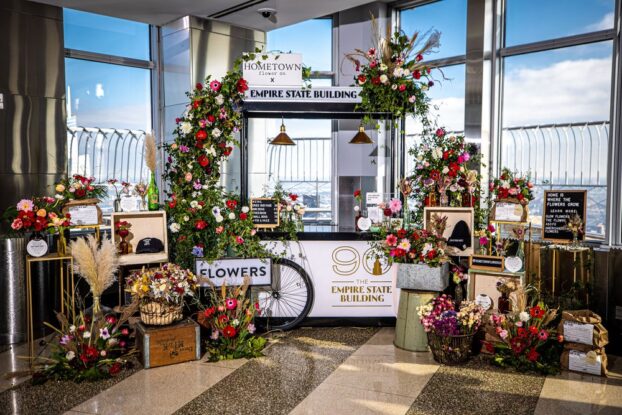
Well there is another message and you’ll hear it today. It’s good news – and you already know it! Local Flowers Come to the Rescue for Valentine’s Day, with a new approach to help Cupid get flowers to gals and pals.
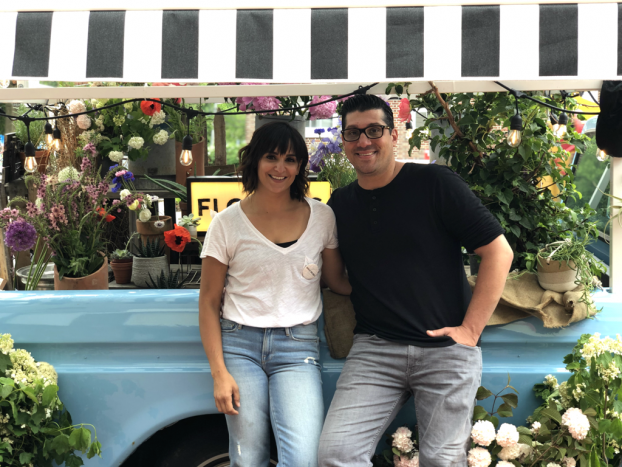
One of our members is doing something incredible and I can’t wait to introduce you to Jaclyn Rutigliano of Hometown Flower Co. Based on Long Island, Hometown Flower Co. partnered with the Empire State Building to present “Local is Beautiful” – a Valentine’s Day Floral Installation and Pop-Up Shop celebrating New York and New Jersey-grown flowers.
Visitors to the Empire State Building’s 86th floor Observatory Deck from last Thursday, February 10th through Monday, February 14th were greeted with an eye-catching floral installation designed 100-percent foam free and exclusively with fresh flowers sourced directly from New York and New Jersey growers.
We joined Jaclyn last week while she was putting the finishing details on her pop-up to record a visit and learn more about how this promotion came together. By way of quick background, Jaclyn and her husband and partner Marc Iervolino founded Hometown Flower Co. in 2019 as a Long Island-based sustainable floral design studio and pop-up flower truck. A third-generation floral design, Jaclyn is a past guest of the Slow Flowers Podcast and she and Marc are featured in Where We Bloom, a book I wrote in 2021.
Thanks so much for joining us today to get in the Local is Beautiful Valentine’s Day spirit with Jaclyn. I will share the Floral Facts and talking points that Jaclyn developed for the media, lifestyle influencers, visitors to the Empire State Building and flower customers – Slow Flowers provided support for the collateral material that Hometown Flower Co. shared and we’re so excited to help them get the word out.
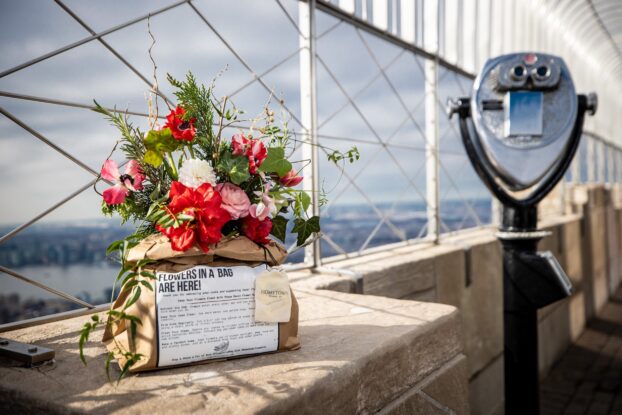
WHY LOCAL FLOWERS?
The majority of the floral industry’s flowers are harvested by workers marginally compensated, around 60% of whom are women. They are then bred for long distance air travel (hence, no more natural floral fragrances) which comes with a massive carbon footprint from long distance air travel. Most stems are already covered in chemical pesticides but then get topped off with a warm welcome at the border with a spraying of Roundup upon entry into the U.S. Nothing says “stop and smell the roses” like a good whiff of Roundup at your nostrils! Flowers then get trucked to various wholesalers who have purchased from a global marketplace, where they then remain until a florist purchases. Once at a florist, they remain again until use for a special event or for a customer order- who then desires a product that will last at least one week. Hometown Flower Co. believes there is a better alternative: source directly from local growers, providing the freshest possible flowers within just a couple of days from when they were cut.
Some Takeaway Floral Facts:
- Did you know, every year Colombia exports ~30 million roses to the U.S. for Valentine’s Day? That’s a long way to travel! Between the carbon footprint & the pesticides sprayed at the border, we think there’s a better alternative: local flowers.
- 74% of consumers don’t know where their flowers come from. Currently the U.S. imports ~80% of flowers sold and 200,132 TONS of flowers land in Miami each year. During the weeks of Valentine’s Day and Mother’s Day, 80,000-130,000 boxes of flowers arrive daily, equaling seven daily flights, six days per week.
- What can you do if you live in a region that does not have easily accessible locally-grown flowers? Look for florists and farmers who ship nationwide at SlowFlowers.com, TheFlowry.com, or check for Certified American Grown labeling for your grocery store blooms.
- Floral Foam = Plastic. Did you know, the “green stuff” used by many florists to keep designs hydrated is actually a single-use plastic? This outdated and unnecessary design hack ends up in our landfills and is filling up our waterways with microplastics. Help the floral industry ditch the foam: order your flowers sans floral foam.
- There are flower farmers currently located in all 50 states. 58% of respondents to a recent survey said they want to support locally-grown flowers. Here’s what consumers can do:
- Request locally-grown flowers from your florist
- Find sustainable farmers & florists at SlowFlowers.com
- Look for the Certified American Grown sticker on packaging
Find and follow Hometown Flower Collective at these social places:
See more pretty from HFC on Pinterest
Join our February Member Meet-Up
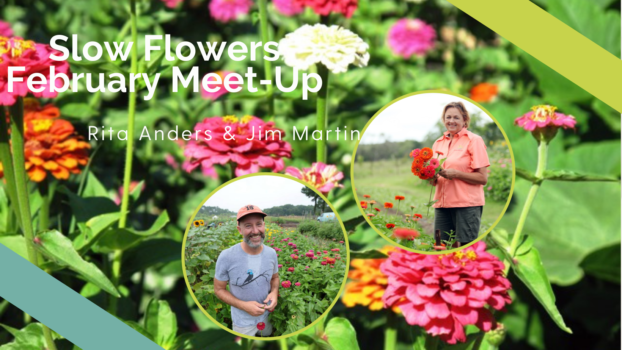
owner of Cuts of Color (Weimar, Texas)
This Friday is our February Slow Flowers Member Meet-Up and you’ll want to sign up to join us at 9 am Pacific/Noon Eastern on February 18th. The link to preregister can be found below or in our Instagram Linktree profile for @slowflowerssociety.
I’m so excited about this month’s topic — our focus is on winter flower crops and designing from the garden in winter. This session is inspired by the fantastic conference I attended and spoke at in Southern Flower Symposium in Charleston, S.C., produced by Jim Martin of Compost in my Shoe and fellow members of Low Country Flower Growers in August 2018. Cuts of Color’s Rita Anders was a keynote presenter, speaking on the topic: “Optimizing Cut Flower Production in our Southern Climate” — and it was an incredible session that enhanced people’s understanding of how they could extend the seasons and grow during the winter months!
We’ve invited Rita to give us a peek into her winter growing practices in Weimar, Texas, and asked Jim to share a floral design demo and talk about winter growing in Charleston. His winter floral designs from South Carolina have been blowing my mind, especially because so much of what he designs with is cut from his own garden. You will love this session! We’ll see you there!
Thank you to our Sponsors
This show is brought to you by Slowflowers.com, the free, online directory to more than 880 florists, shops, and studios who design with local, seasonal and sustainable flowers and to the farms that grow those blooms. It’s the conscious choice for buying and sending flowers.
Thank you to our lead sponsor, returning for 2022, Farmgirl Flowers. Farmgirl Flowers delivers iconic burlap-wrapped bouquets and lush, abundant arrangements to customers across the U.S., supporting U.S. flower farms by purchasing more than $10 million dollars of U.S.-grown fresh and seasonal flowers and foliage annually. Discover more at farmgirlflowers.com.
More thanks goes to:
Red Twig Farms. Based in Johnstown, Ohio, Red Twig Farms is a family-owned farm specializing in peonies, daffodils, tulips and branches, a popular peony-bouquet-by-mail program and their Spread the Hope Campaign where customers purchase 10 tulip stems for essential workers and others in their community. Learn more at redtwigfarms.com.
The Seattle Wholesale Growers Market, a farmer-owned cooperative committed to providing the very best the Pacific Northwest has to offer in cut flowers, foliage and plants. The Growers Market’s mission is to foster a vibrant marketplace that sustains local flower farms and provides top-quality products and service to the local floral industry. Visit them at seattlewholesalegrowersmarket.com.
Longfield Gardens, which provides home gardeners with high quality flower bulbs and perennials. Their online store offers plants for every region and every season, from tulips and daffodils to dahlias, caladiums and amaryllis. Check out the full catalog at Longfield Gardens at longfield-gardens.com.
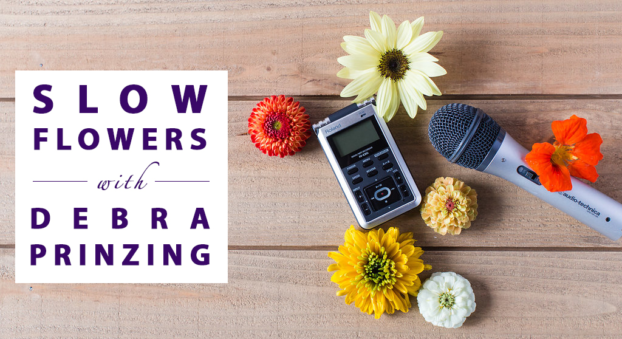
Thanks so much for joining us today! The Slow Flowers Podcast is a member-supported endeavor, downloaded more than 815,000 times by listeners like you. Thank you for listening, commenting and sharing – it means so much. As our movement gains more supporters and more passionate participants who believe in the importance of our domestic cut flower industry, the momentum is contagious. I know you feel it, too.
If you’re new to our weekly Show and our long-running Podcast, check out all of our resources at Slow Flowers Society.com and consider making a donation to sustain Slow Flowers’ ongoing advocacy, education and outreach activities. You can find the donate button in the column to the right here at slowflowerspodcast.com.
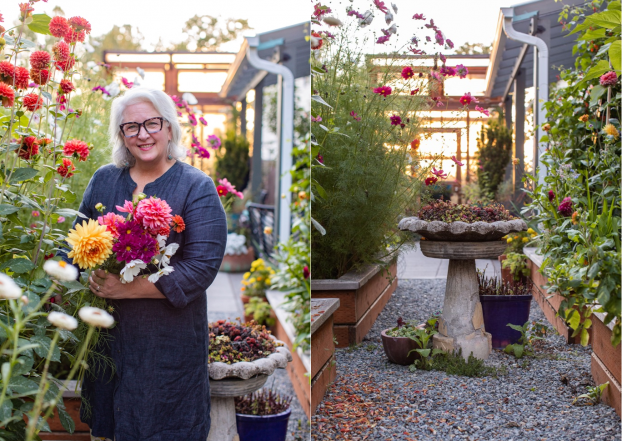
I’m Debra Prinzing, host and producer of the Slow Flowers Show & Podcast. Next week, you’re invited to join me in putting more Slow Flowers on the table, one stem, one vase at a time. The content and opinions expressed here are either mine alone or those of my guests alone, independent of any podcast sponsor or other person, company or organization.
The Slow Flowers Podcast is engineered and edited by Andrew Brenlan. You can learn more about Andrew’s work at soundbodymovement.com.
Music Credits:
Caprese; Turning on the Lights; Gaena
by Blue Dot Sessions
http://www.sessions.blue
Lovely
by Tryad
http://tryad.bandcamp.com/album/instrumentals
http://creativecommons.org/licenses/by-sa/3.0/
In The Field
audionautix.com









